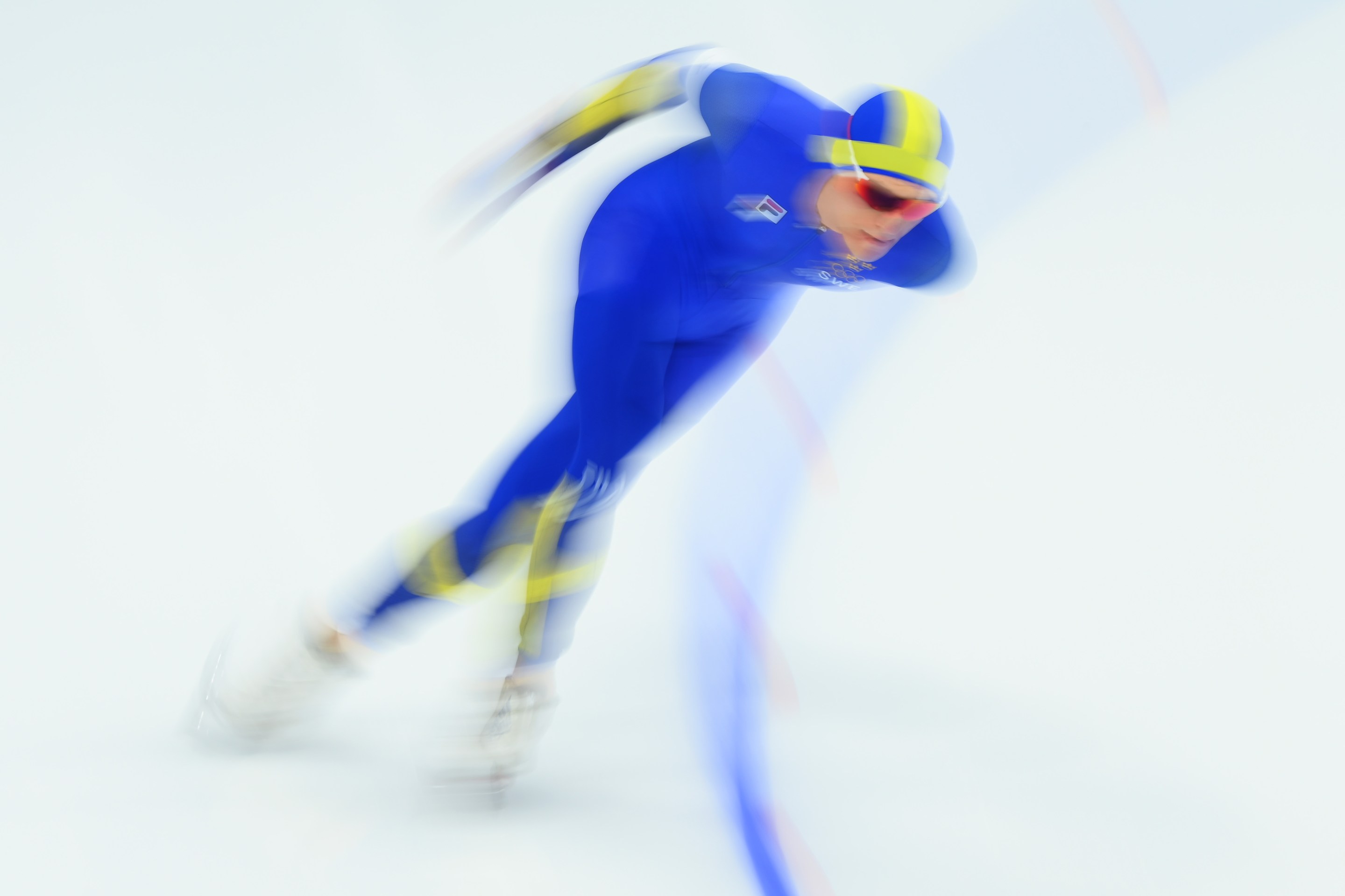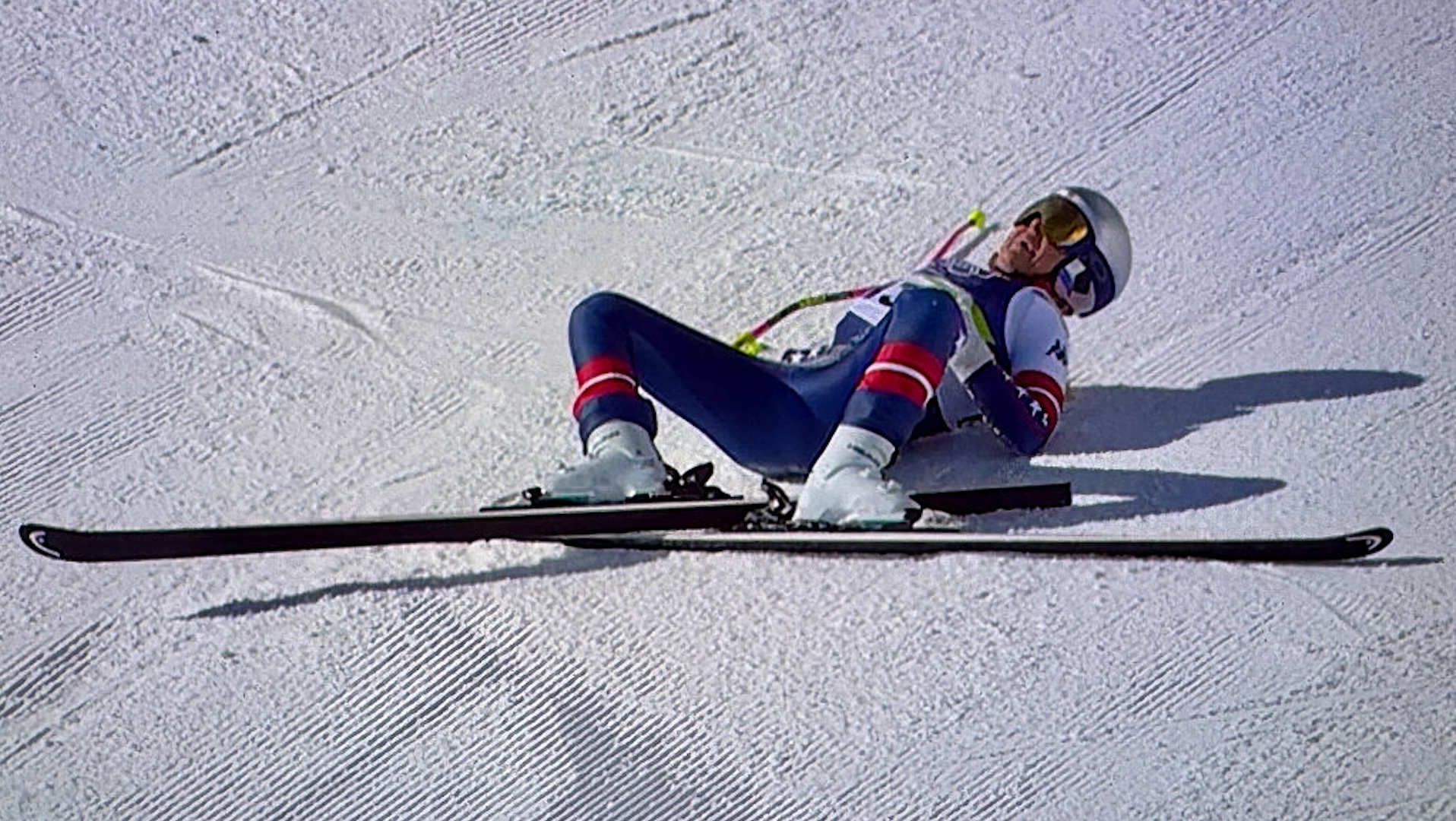There's a Twitter joke that says each Olympic event should include a "reference person," some average Joe against whom you could measure the Olympians. Forget the barely perceptible gaps among the top eight or so people in a given discipline. What of the enormous gap between them and us? I'm not sure about the idea. That much stronger, faster people than me sprint and swim the Earth isn't something I need to see to believe. But the impulse makes sense; admiring absurd intraspecies differences is one of the treats of being human. It's why I read and couldn't put down a 63-page PDF published last month by the Swedish speedskater Nils van der Poel, the week he set a world record in the 10,000-meter race in Beijing. Van der Poel dedicated How to Skate a 10K to aspiring record-breakers—"for those who might want to, I wrote this document"—but the project strikes me less as a manual and more like an athlete's version of donating your papers to a library, laying out the mundanities of your life and inviting everyone to have a look.
David Foster Wallace, in a very funny essay, once lamented that "geniuses-in-motion" couldn't also be "geniuses-in-reflection." He was crushed by the tennis star Tracy Austin's autobiography, which he'd read eagerly but found filled with flat sentences, like, "I immediately knew what I had done, which was to win the U.S. Open, and I was thrilled." He wondered whether the mental blankness that makes an athlete a bad interview could be the same quality that enables their performance. When victorious athletes talk of just taking things one pitch or shift or possession at a time, Wallace wrote, maybe they're telling the truth. Maybe nothing was going through their mind when they hit the shot or scored the goal, and maybe that was why they had. Now that I think about it, even the better sports memoirs I've read resonate most when they capture life off the playing field. Andre Agassi's resentment of his own celebrity makes Open sing; Ken Dryden's book is least convincing when he tries to put the goaltender's psyche into words, and loveliest on strange tangents, or when he's drawing mini-portraits of Scotty Bowman and Guy Lafleur.
Can an author-athlete overcome the athlete's inherent mental cool? Van der Poel's voice is cool but wonderfully moody; he has this funny habit in his writing of waffling between logic and impulse. He didn't perform a VO2 max endurance test in the lead-up to the Olympics because of the travel and time commitment involved in arranging it. Reasonable explanation out of the way, he continues, "Also I hated it. It sucked." This is where I disagree with Wallace. I don't know that we need articulated anguish and triumph to understand an athlete. "It sucked" seems perfectly comprehensible to me.
Sometimes it's the most matter-of-fact sentences that feel the most revealing. A few paragraphs on the physics of his skating thrilled me:
I assumed that I created speed by creating a horizontal, sideways, force within the push, not by pushing vertically downwards. All the force that went downwards was a waste of energy that didn’t bring me faster forward. Therefore the angle of the blade (ice-to-blade), during the push part of the stride, is essential as it defines how much of the energy of the push will go sideways (horizontally, creating speed) and how much will go downwards (vertically, wasting energy).
My push was sideways, but relative to my body position my push was a one legged squat jump. Speed skating is basically a one legged squat jump performed with maximum lean. I did not push to the side, I performed a one legged squat jump whilst leaning.
I noticed van der Poel's particular obsession with living life efficiently. Not just the wasted energy on the downward push—he sees everything in those terms. Take his thoughts on stretching: "All training sessions are performed at the expense of other, more efficient, training sessions, or at the expense of recovery after these sessions. My point isn’t that stretching is useless. If you need to stretch then go ahead and bend over. But do not fool yourself; do not drop hours from the essential sessions in order to perform something that sounds cool or is easy." He prides himself on skating more competition-speed laps in training than his competitors usually do; "you will become good at whatever it is that you train" is his philosophy. But even what seems like wasted time van der Poel can spin into the opposite. Being able to have fun outside the rink puts less pressure on his skating career, which makes him better, he explains. He loves his friends, and "owed it to them to try to live up to my full potential." The more stress there is in his relationships, the less he can exert himself as an athlete. He understands everything in his life in relation to everything else, all one big equation.
You do, however, get the sense that for all his interest in optimization, van der Poel dreads taking himself too seriously. "If something kept me motivated I considered it to be good," he writes. "Sometimes all I needed was a beer, or eight beers."
So much of an elite athlete's life is unglamorous. During aerobic season, he drinks whipped cream and crushes potato chips to keep his calorie intake high enough. ("My dental health was shit during this period," he admits.) The journey is lonely, mostly solo training sessions because "no one else wanted to join my lifestyle." His individual sport requires its fair share of thorny relationship management, too. What balance should be struck between a coach's experience and van der Poel's knowledge of his own body? They disagree sometimes, concede one argument in the hopes of winning another, each careful to affirm one's trust in the other. A delicate dance, though always, van der Poel feels he has the final decision. Eventually, the coach becomes "the best friend I ever had." And then there is how to handle the media. "They are not snakes, but they need stuff to print and if I don’t give them something they will write something else, which I will not be able to control," he says.
The second half of the document, the last 30 or so pages, is just a meticulous daily log he’s kept of his training regimen in the three years leading up to the Olympics; its final entry is “Travel China." It's the best part. The rigors of his lifestyle are quantified and unvarnished. Each day has a space for the number of hours and the type of activity—running, cycling, skimo, squats, and so on. Miscellaneous notes go in the other columns. He records the terrain of his run, the name of an exercise companion, how his body feels, or the level of intensity (often it is 60 to 75 percent of his maximum heart rate, a level he calls "A1").
Van der Poel's dry sense of humor survives the change in format. “Ankles fucked” explains a shorter-than-usual run. A few days later, “Ankles still fucked,” until finally, the next week, “Ankles worked again :D”. Early in the essay section of the book, he talks up his 5-2 method: five days of training followed by two days of rest. I chuckled at a pair of rest days whose boxes read "Drunk" and "Hangover"; Nils has re-invented "the weekend." There's no space for holidays in his mental calendar, however. One Christmas Eve, he writes to himself, “Merry christmas mother fucker.” He cycles for six hours on Christmas Day.
I began to read a life into the cells of a spreadsheet, to sympathize with "SICK" and "extremely tired," to wonder about these people joining him on runs and ski trips, Tove and Johan and Labbe. Who were they, what were they like, what did they think of Nils van der Poel? I felt something like relief when a column usually tracking cycling wattage and distances swapped those out for "Played some tennis with friends." This was me searching, I think, for the "reference person" within van der Poel, not alongside him or in his wake. I wanted the gap between him and humanity as I know it closed, not magnified. Everyone plays tennis with friends. Everyone fucks up their ankles.
But those things that caught my eye were exceptions to the rule. Mostly, the log told me things about an elite athlete's brain that prose never could. One entry shattered me: “Mother passed away,” on March 3, 2021. The next day, he runs again for an hour and a half—mixed terrain, A1 intensity.






